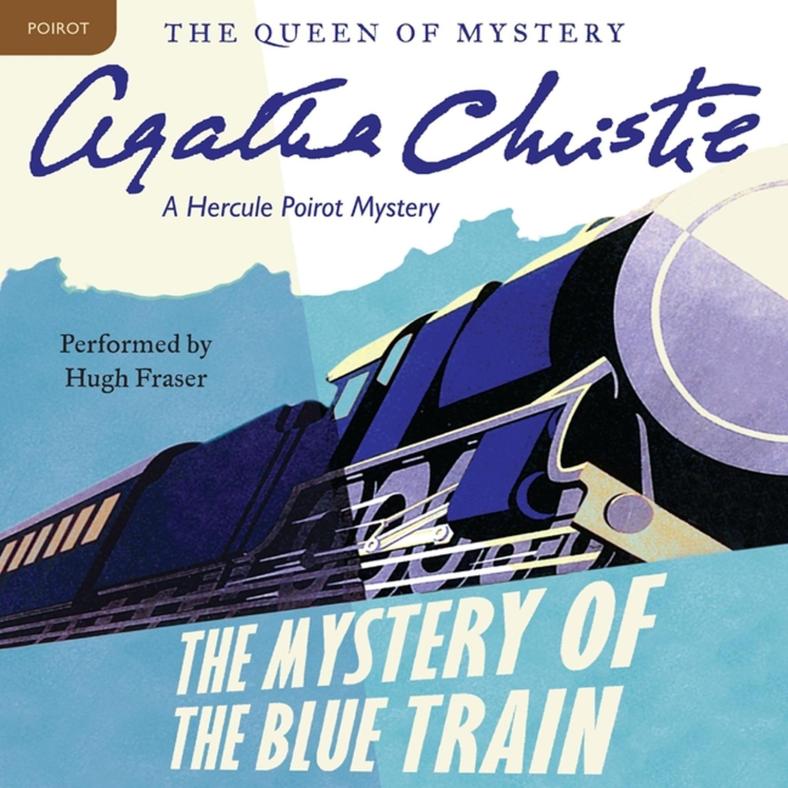Had I not been reading ‘The Mystery Of The Blue Train’ as part of a monthly group read with the Appointment With Agatha community on GoodReads, I’d probably have abandoned it before I was halfway through. I’m glad I didn’t because the second half of the book was entertaining but getting there was a slog.
I’m told that Christie didn’t like this book and that she wrote it while going through a divorce and while she was distracted by caring for her young daughter. Perhaps that goes some way towards explaining why parts of the book felt so thinly written and why the narrative was so unfocused.
For the first third of the book, the writing had patches where it was quite threadbare. The dialogue was OK but the text is very lacklustre. It felt like a boilerplate text the was put in for a first draft to move the story along and was then never revisited.
The thin writing made me more irritated than usual by the way foreigners were depicted. The text has English exceptionalism bred in the bone. The foreigners in ‘The Mystery of the Blue Train’ were so cartoonish that they seemed straight off the pages of a Tin Tin comic strip. At least Hergé was trying to be funny.
To be fair, Derek Kettering, the only English nobleman in the book, was an absolute horror. He was also quite believable. Under the present government, a philandering, financially reckless, misogynist like Kettering, prone to lying and betrayal, would probably be made a Cabinet Minister. This perhaps shows that I only dislike Christie’s prejudices when they differ from my own.
Where I parted company with Christie was when she presented Kettering as a man ready to be redeemed by the love of a good woman and suggested that such a woman would easily fall in love with him. Bullying narcissist as romantic lead? Not a great choice.
I think Christie gave herself a problem with the ‘The Mystery Of The Blue Train’ that she wasn’t able to solve. She had a big cast, multiple locations, a complex plot and no narrator to pull them all together. This made it hard for me as the reader to know what to focus on. We followed different actors in multiple locations as they crossed each other’s paths and affected each other’s stories but there was no intensity, no sense of things coming together in an inevitable but as yet unknown pattern. Poirot appeared and then disappeared. All the characters popped in and out of the plot like actors in a French farce. Normally, in Poirot books, Christie uses a central narrator, typically Hastings, to give a cohesive view. Even when Hasting’s has fundamentally misunderstood what is going on, the story remains focused.
An unexpected side-effect of not having Hastings as the teller of the tale was how Poirot was presented. It turns out that Poirot, without the soft-focus filter of Hasting’s admiration, comes across as insufferably arrogant.
The second half of the book, where we finally got down to the business of solving the mystery, worked reasonably well, although the very elaborate plot was rather clumsily revealed.
There were some very good scenes in the book. Whenever the action moved to St. Mary Meads, everything was suddenly in focus. The dialogue improves and the characters felt real. I also liked watching Poirot extracting information through a mixture of bullying, blackmail and trading favours.
The ending of the book made me roll my eyes. It has Poirot advising a woman who has proven to be intelligent and insightful to find a good husband – what superb advice for a life-long bachelor to give. He uses a train metaphor to describe life and falling in love. The basic message was ‘something will turn up.’ He ends with:
‘Trust the train mademoiselle for it is le bon Dieu who drives it’
That may be the stupidest thing I’ve ever heard Poirot say.
Oh well, next month’s Christie book is ‘The Seven Dials’ which has the grimly determined Inspector Battle rather than Poirot, a murder in a manor house and a plucky heroine, so it’s almost bound to be better.

I haven’t read this one, so ‘forewarned is forearmed’ perhaps. Thank you Mike.
LikeLiked by 1 person
On balance I agree, except I think you’re mistaken — the final scene does not involve Katherine. It is between Poirot and Ms Lenox Tamplin, who is full of the melancholy of jilted youth because she loves Kettering, who had gone off to St Mary Mead, we assume to be with Katherine. I took Poirot’s lines in a very different vein, as meant to comfort a young woman who feels passed over; and even wondered whether Christie meant to hint that Kettering was returning for Lenox, closing off an earlier slightly clumsy hint in conversation between Poirot and Katherine that “someone” loves Derek.
LikeLike
I see what you mean. Katherine wasn’t the woman I was referring to but Lennox hasn’t recently become wealthy. I’ll edit the review. Thanks for spotting that.
It doesn’t change my view on Poirot although that might be confirmation bias on my part as I’ve never liked the man.
LikeLike